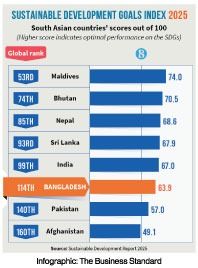- info@ficci.org.bd
- |
- +880248814801, +880248814802
- Contact Us
- |
- Become a Member
- |
- |
- |
- |
- |

Around the world, corporate sector is often identified as greedy. It is this insatiable desire to grow that helps it to innovate relentlessly and improve on process and cost efficiency. Shareholders are also always keen to see the bottom-line fattening with passage of time.
Corporates with sound governance practices are known to pursue growth in more sustainable manner than those who lack in governance. But there is a growing recognition among the corporates that they have to be concerned beyond just profiteering. As a result concepts like sustainable growth through adherence to Environmental, Social and Governance (ESG) framework is now being mainstreamed across the corporate sector.
One of the key catalyst in this evolution is the changing landscape of customers' choice. As the young generation slowly becomes active members of an economy, they are demanding value and purpose based behaviour from the corporate sector. The traditional token philanthropic initiatives are not cutting it for the customers anymore. Hence, the corporates are willingly embracing their role as a responsible member of the society.
 When the corporates are viewed from that lens, one may argue that there is a massive opportunity for them to contribute to the development agenda of the country they operate in. Because, ESG framework essentially compels them to be better at serving their customers, introducing innovative products, services and solutions while making sure their growth happens in harmony with the societal and environmental needs. Such outcomes can only be achieved when the organizations are practicing robust governance.
When the corporates are viewed from that lens, one may argue that there is a massive opportunity for them to contribute to the development agenda of the country they operate in. Because, ESG framework essentially compels them to be better at serving their customers, introducing innovative products, services and solutions while making sure their growth happens in harmony with the societal and environmental needs. Such outcomes can only be achieved when the organizations are practicing robust governance.
With that template in mind, if we look across the industry verticals, we will find that each company can contribute immensely to the targets set in the Sustainable Development Goals. For example, the food industry can join hands with the public and the development sector to complement the national drive on food and nutrition. Beverage and bottled water industry can take up initiatives to promote and facilitate drives for easier access to pure drinking water and proper sanitation.
The real estate industry can collaborate with the public and the development sector to introduce low cost innovative solution to ensure proper housing for all citizens of the country. Similarly, with an enabling regulatory environment, the telecom sector can contribute immensely in bridging the digital divide in the country. Hence, simply put, the possibilities are endless. The only thing that can limit is our lack of imagination and collaboration.
 Now, lets take a look at where we stand in the global community in achieving the SDG targets. According to the Sustainable Development Report 2025, Bangladesh has been placed among the bottom three South Asian countries in the 2025 Sustainable Development Goals (SDG) Index, ranking 114th out of 167 nations globally with a score of 63.9 out of 100. The index has positioned Bangladesh ahead of only Pakistan and Afghanistan in South Asia.
Now, lets take a look at where we stand in the global community in achieving the SDG targets. According to the Sustainable Development Report 2025, Bangladesh has been placed among the bottom three South Asian countries in the 2025 Sustainable Development Goals (SDG) Index, ranking 114th out of 167 nations globally with a score of 63.9 out of 100. The index has positioned Bangladesh ahead of only Pakistan and Afghanistan in South Asia.
Moreover, Bangladesh has been on track or maintaining progress in only 20.8% of the SDG targets over the past decade. Released by the UN Sustainable Development Solutions Network, the 10th edition of the report shows that Bangladesh has made limited progress on 44.2% of the targets, while 35.1% are worsening.
Unfortunately, we can't rely on foreign aid to supplement the Government's effort in making up for the shortcomings in our SDG journey. In 2024 alone, a staggering $25 billion gap emerged between the funds needed for United Nations appeals and the contributions received.
![]()
Until recently, the U.S. was the world's largest aid donor, playing a critical role i international assistance. We have all seen how USAID was dismantled. The OECD projects a 9 to 17% drop in official development assistance (ODA) in 2025. This comes on top of a 9% drop in 2024. ODA in 2027 is projected to fall back to 2020 levels.
Given the stark realities, we literally have our backs against the wall. The only out of this rut is to embrace the corporate sector to support the national drive for sustainable development.
All the regulatory bodies hold the key to this paradigm shift. They can collaborate with the corporate sector to stimulate sustainable growth for them as well as the country or continue to stay in their high horses and let go of this once in a lifetime opportunity. Government has to choose which path it wants to take.





